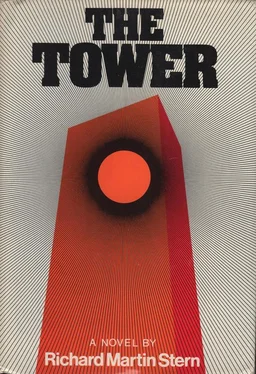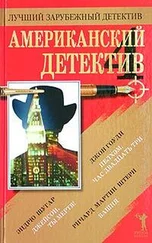Barnes lifted his shoulders and let them fall. “Even if they do, it’s a sad day to remember.” He paused. “For us all,” he said.
“Seventy-six!” the fire commissioner said. His voice was hoarse from smoke and strain. He coughed, coughed again with a deep retching sound.
The senator turned from the west bank of windows. Breathing was hard and painful. He looked around the great room.
Over by the fire door the white tablecloth marked Grover Frazee’s remains.
In a nearby chair a man the senator did not know, an elderly man, was slumped, head back, mouth and eyes open. As nearly as the senator could tell, he was no longer breathing.
Ben Caldwell lay in the center of the floor where he had collapsed. His body had curled itself into the fetal position. He made no movement.
The waiter on the floor held up his bottle offering a drink. He had a silly grin on his face.
“Thanks anyway,” the senator said, “but I’ll wait a little.” His voice sounded strange, heavy. He straightened himself with effort and walked toward the office.
The governor was in the desk chair. He looked up, smiled, and coughed. When the coughing had stopped, “Sit down, Jake,” he said. “What shall we talk about?”
Together the chief and Kronski hauled the man out of the breeches buoy bag. “Hold him up.” the chief said, and added, raising his voice, “Oxygen over here!” He waved at the Tower Room windows and slowly the breeches buoy began its return trip.
“Seventy-seven,” the chief said. He spoke into the walkie-talkie. “Name of Bucholtz. He’ll need ambulance care.”
He stood waiting then, large and massively calm, his eyes on the Tower Room windows, while Kronski paid out the breeches buoy guideline.
Here on the Trade Center roof from the beginning it had been cold. Now in the last slanting rays of the sun the evening chill worked its way into a man’s bones. Kronski stomped his feet and beat his hands together. “Freeze the balls off a brass monkey.” he said.
The chief showed no signs of discomfort. “Think of those poor bastards still over there,” he said. “Heat enough, and to spare.” And then, “Look!” For the first time his voice rose perceptibly. “Look there! It’s coming out empty!’
The breeches buoy swung through the window. No hand held it back. Of its own weight it began the careening slide down the immense curve, faster, faster, swinging, swaying like a mad thing—
“Oh, Jesus!” the chief said. “That’s done it!” He was pointing.
Like a snake the heavy supporting line slid through the window, its end whipping from the weight of the knots that still held, the line itself melted through from the heat of the beam it had been tied to. It fell endlessly.
“Stand clear!” the chief said, and jumped aside himself as the heavy line lashed viciously against its fastening on the roof. Then it was still.
The chief strained to see through the Tower Room windows. He held out his hand. “Binoculars.” He studied the room through the glasses in silence and then let them dangle from their lanyard around his neck.
Slowly he raised the walkie-talkie. “Roof to Trailer.”
“Trailer here.” Nat’s voice.
The chief’s voice was expressionless. “The line has parted. You’ll find the breeches buoy somewhere down below. It’s empty.”
Nat said softly, “Oh my God!”
“It doesn’t matter,” the chief said. “I can’t see any movement over there. I think it’s all over.” He paused. “The best we could,” he said. “It wasn’t enough.”
The time was 8:41. It had been four hours and eighteen minutes since the explosion.
Gotterdammerung.
They walked in silence in the evening chill, block after block, without destination, each deep in his own thoughts.
They stopped at last, almost as at an inaudible signal, and turned to look back.
The tip of the great tower caught the last of the day’s light. Below, the structure glowed in gathering darkness. Like an ember after the leaping flames have died, it no longer seemed to writhe.
“The chief said it,” Nat said. “The best we could and it wasn’t enough. Maybe it wasn’t the best we could.” His voice was low pitched, savage. “Maybe—”
“It’s done,” Patty said. “Leave it there, and go on.”
“On where?”
“Just on.” Patty’s voice was gentle. “Ahead, not back. There is no turning back.” She paused. “It’s all—behind us. All of it.”
They began to walk again. Together.
Richard Martin Stern’s most recent novel, Stanfield Harvest , was a Reader’s Digest Condensed Book Club selection. Among his other novels are Brood of Eagles and The Bright Road to Fear . He lives in Santa Fe and is at work on another novel set in the contemporary mountain West.
Richard Stern is also well known as one of the most accomplished mystery writers in America, particularly for his mysteries set in Santa Fe and featuring Detective Sergeant Johnny Ortiz.

BOOKS BY RICHARD MARTIN STERN
The Tower
Death in the Snow
Stanfield Harvest
Manuscript for Murder
Murder in the Walls
You Don’t Need an Enemy
Brood of Eagles
Merry Go Round
The Kessler Legacy
Right Hand Opposite
Cry Havoc
High Hazard
These Unlucky Deeds
The Search for Tabatha Carr
The Bright Road to Fear

Jerry eBooks
No copyright  2016 by Jerry eBooks
2016 by Jerry eBooks
No rights reserved. All parts of this book may be reproduced in any form and by any means for any purpose without any prior written consent of anyone.
Copyright © 1973 BY RICHARD MARTIN STERN
All rights reserved, including the right to reproduce this book, or parts thereof, in any form, except for the inclusion of brief quotations in a review.
LIBRARY OF CONGRESS CATALOG CARD NUMBER 73-76565
MANUFACTURED IN THE UNITED STATES OF AMERICA
DESIGNED BY JACQUES CHAZAUD



 2016 by Jerry eBooks
2016 by Jerry eBooks








